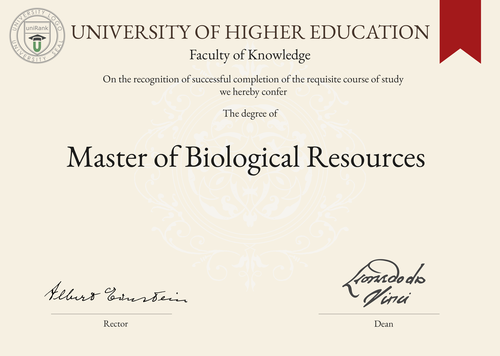
Master of Biological Resources (M.B.R.)
Guide to Master of Biological Resources Program/Course/Degree
Master of Biological Resources (M.B.R.)

Program Name:
Master of Biological ResourcesProgram or Degree abbreviation:
M.B.R.Duration range:
The duration of the Master of Biological Resources program can vary depending on the country or university. Typically, it ranges from 1 to 2 years.Tuition range:
The tuition fees for the Master of Biological Resources program can also vary based on the country or university. The range can vary from affordable to expensive, depending on the location and reputation of the institution.Overview:
The Master of Biological Resources program is designed to provide students with advanced knowledge and skills in the field of biological resources. It focuses on the sustainable management, conservation and utilization of biological resources, including plants, animals and ecosystems. Students gain a deep understanding of biodiversity, ecology, genetics and environmental science.Curriculum Overview by year:
The curriculum of the Master of Biological Resources program is structured to cover a wide range of subjects related to biological resources. The specific courses offered may vary by university, but typically include: Year 1: - Introduction to Biological Resources - Biodiversity Conservation - Ecology and Ecosystem Management - Genetics and Evolution - Research Methods in Biological Sciences Year 2: - Sustainable Resource Management - Environmental Policy and Law - Biotechnology and Genetic Engineering - Wildlife Management - Thesis or Research ProjectKey Components:
The key components of the Master of Biological Resources program include: 1. Biodiversity Conservation: Understanding and preserving the variety of life forms on Earth. 2. Ecology and Ecosystem Management: Studying the interactions between organisms and their environment. 3. Genetics and Evolution: Exploring the genetic basis of biological diversity and evolutionary processes. 4. Sustainable Resource Management: Developing strategies for the sustainable use and conservation of biological resources. 5. Environmental Policy and Law: Understanding the legal and policy frameworks related to biological resources.Career Prospects:
Graduates of the Master of Biological Resources program have diverse career opportunities. They can work in various sectors, including: - Environmental consulting firms - Government agencies - Non-profit organizations - Research institutions - Wildlife and conservation organizations Potential job roles include environmental scientist, conservation biologist, wildlife biologist, research associate and policy analyst.Salary Expectations:
The salary expectations for graduates of the Master of Biological Resources program can vary depending on factors such as location, job role and level of experience. Generally, professionals in this field can earn competitive salaries, with the potential for growth as they gain more experience and expertise. For a more accurate understanding of salary expectations, you can utilize the Job Sites Search Engine, from our sister site jobRank, which searches over 4,600 job sites worldwide. Make sure to specify not only the job title but also the country you are interested in.Conclusions:
It is important to note that the duration, tuition fees, curriculum, key components, career prospects and salary expectations of the Master of Biological Resources program can vary based on the chosen country or location of study, as well as the chosen university. Prospective students are advised to research and compare different programs and institutions to find the best fit for their academic and career goals. Visitors interested in pursuing a Master of Biological Resources degree can search for programs offered worldwide through the uniRank World Universities Search Engine. This powerful tool allows individuals to explore universities and their respective programs, helping them find the ideal educational institution to pursue their studies in this field.World Universities Search Engine
search for Master of Biological Resources (M.B.R.) and add the Location (country, state etc.) or specific University you are interested in studying at.
Query examples:
- Master of Biological Resources (M.B.R.) United States
- Master of Biological Resources (M.B.R.) United Kingdom online
- Master of Biological Resources (M.B.R.) Australia international students
- Master of Biological Resources (M.B.R.) University of California
- Master of Biological Resources (M.B.R.) University of London tuition fees
- Master of Biological Resources (M.B.R.) University of Sydney scholarships
Share Program/Course
Interesting? Share this program/course/degree info with your friends now.